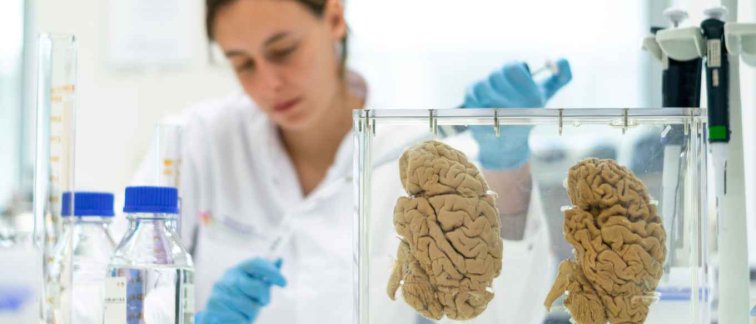In our society, one in four people suffer from a brain disorder. ‘For many brain disorders, little is known about the molecular mechanisms underlying them,’ says consortium leader Inge Huitinga, professor by special appointment of Neuroimmunology at the UvA and head of the Neuroimmunology research group of the Netherlands Institute for Neuroscience (NIN-KNAW). 'The relationship between changes in brain tissue and patients' symptoms is very complex. We do not really know which types of cells, which brain networks and which molecular processes cause the psychiatric symptoms and complaints of patients with a brain disease. Some symptoms occur in various conditions and the clinical picture can look very different from patient to patient. For example, someone may have Alzheimer's or frontotemporal dementia, but also develop depressive symptoms. That can lead to incorrect diagnoses.'
Neurobiology, chemistry and AI
‘We think that these psychiatric symptoms are related to changes that occur at the level of individual cells or structures within cells, disrupting brain networks in various brain regions,’ says Paul Lucassen, professor of Brain Plasticity at the UvA. 'The place where nerve cells and supporting cells meet, the so-called synapse-glia interface, is very important. Brain scans have already mapped many global changes in brain tissue, but these techniques are not sensitive enough to see what is happening in the cells on a super-small scale. If you do not know which soft cells and which molecules are changing, you cannot reverse the changes.’
However, all kinds of promising techniques have emerged in chemistry and molecular biology, such as single cell transcriptomics, (chemical) proteomics, advanced microscopy and 'click chemistry'. These could fundamentally change research into the human brain. Neurobiologists, psychiatrists, data scientists and chemists are therefore joining forces within iCNS.
Human material
In contrast to traditional brain research, the researchers in iCNS start with human brain material from the Dutch Brain Bank (NHB). They are also setting up a biobank with cerebral fluid and plasma from living patients with a brain disorder. The molecular brain atlas will be created using so-called multi-omics, which will study sixteen important brain areas of neuropsychiatric disorders in great detail. Using new computer approaches and machine learning models, the researchers will link the multi-omics data to the psychiatric symptoms of around 3,000 NHB donors.
Huitinga: 'We can then use innovative chemical methods to see what has changed when certain symptoms are present and how we can influence or correct this in in vitro and in vivo model systems, such as brain organoids.
Groundbreaking insights
Lucassen: ‘The brain atlas will soon allow us to see exactly which cells and molecules in the brain have changed when symptoms such as anxiety, forgetfulness, impulsiveness or depression are present. We expect that on this basis we can develop innovative diagnostic biomarkers for the diagnosis, prognosis and ultimately treatment of the brain disorders that so many people suffer from.'
Peter-Paul Verbeek, Rector Magnificus of the UvA: 'Society faces major challenges when it comes to our mental health. The large-scale and interdisciplinary approach of the new Institute for Chemical Neuroscience, made possible by Gravitation funding, can lead to groundbreaking insights and these are desperately needed.'
Consortium
The Board of Directors of iCNS is formed by: Inge Huitinga (NIN/UvA), Paul Lucassen (UvA), Mario van der Stelt (Leiden University), Bart Eggen (UMC Groningen), Lot de Witte (Radboudumc) and Maarten Kole (NIN/Utrecht University). The research leaders of the sub-projects are: Jörg Hamann (Amsterdam UMC), Inge Holtman (UMC Groningen), Ahmed Mahfouz (LUMC), Sander van Kasteren (Leiden University), Aniko Korosi (UvA) and Femke de Vrij (Erasmus MC).
Further research with Gravitation subsidy
The Gravitation program is executed by NWO on behalf of the Ministry of OCW. The seven consortia selected this year collectively receive €160.5 million to perform top research for ten years. Amsterdam UMC is also involved in another consortium: Lifelong VISION. This project is set to develop new treatments for blindness.

